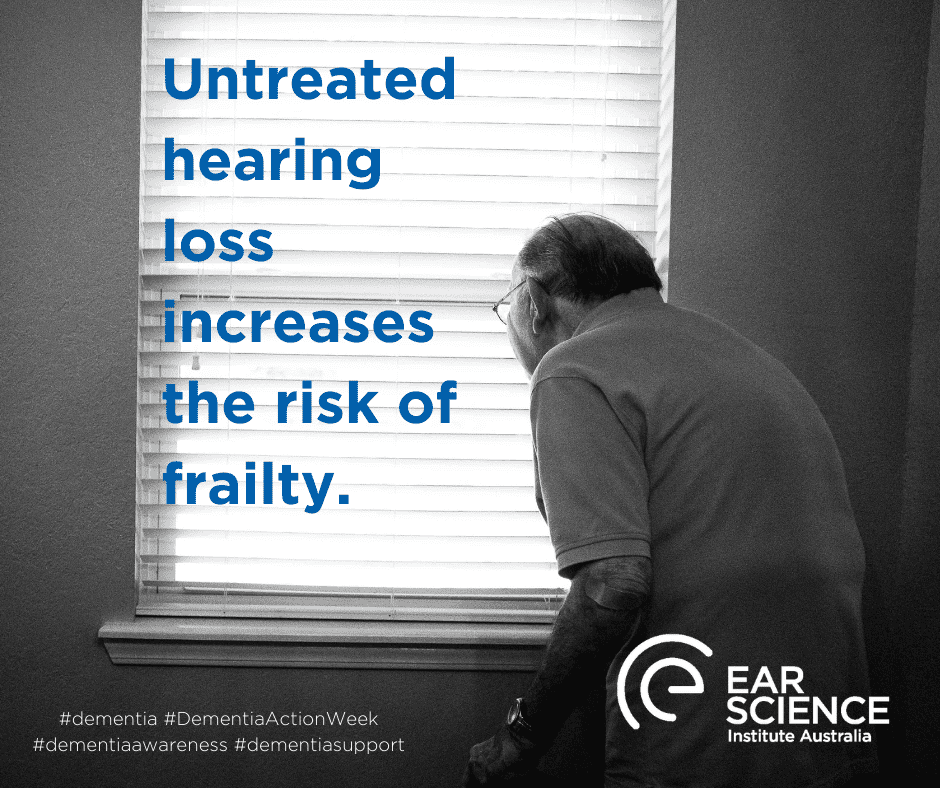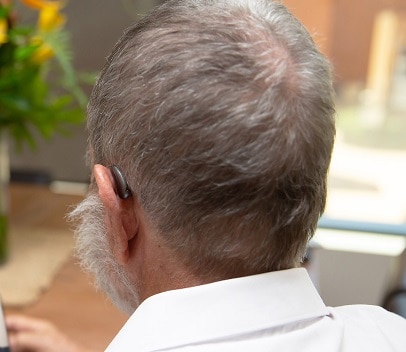HearCog Clinical Trial
The University of Western Australia and Ear Science Institute Australia are conducting a clinical trial to discover if we can reduce cognitive decline by treating hearing loss with hearing aids
We have recruited 300 West Australians who are over 70 with hearing loss and have not used hearing aids before.
Can you imagine a hearing test that also detects early risk signs of dementia? Or a hearing device that tells the user to practice wearing it so their brain can get used to the new amplified sound?
These are just some of the areas our Brain & Hearing program will focus on, right here in Western Australia.
We are the only self-sustaining not for profit research institute, that has successfully integrated industry leading clinical care and research.
Our research has demonstrated that there is an association between untreated hearing loss and the increased risk of dementia and mental distress. We are now translating our research into potential treatments to reduce the risk of dementia to minimise health decline in our rapidly ageing population. With the recent release of the Royal Commission into Aged Care Quality and Service, now more than ever, we need to support our community to age with grace and ensure the humane care of our elders.
We bought together one of the world’s largest hearing device manufacturers, with a world leading university and a medical research institute in a collaboration. All working together on early treatment for hearing loss, aiming to slow down dementia, and developing new interventions to improve the lives of those with hearing loss.
Untreated hearing loss can make everyday life challenging.
More than two‐thirds of older adults above 70 years suffer from age‐related hearing loss.
Recent studies have reported an association between impaired hearing and cognitive impairment and dementia and mental ill‐health.
What are the key risk factors for Dementia?
According to the updated Dementia Prevention, Intervention, and Care: 2020 Report of the Lancet Commission, these are a number of key risk factors for dementia:
- Hearing loss in midlife
- Less education in early life
- Traumatic brain injury
- High blood pressure
- Alcohol (moderate to high weekly use)
- Obesity
- Smoking
- Depression
- Social isolation
- Physical inactivity
- Diabetes
- Air pollution
By making lifestyle changes and modifying these risk factors we could delay or prevent up to 40% of dementia cases.

Recent studies suggested that hearing loss may be a potentially modifiable risk factor associated with frailty
Rong Tian, PHD Student has found that the untreated hearing loss was associated with an 87% increase in the risk of frailty among cross-sectional studies and 56% among longitudinal studies.
Listen up!
Your memory may depend on it
If you have difficulty hearing, Lions Hearing Clinic can help.
REFERENCES Lin FR, Thorpe R, Gordon‐Salant S, Ferrucci L. hearing loss prevalence and risk factors among older adults in the United States. J Gerontol A Biol Sci Med Sci. 2011;66A(5):582‐590. Deal JA, Sharrett AR, Albert MS, et al. Hearing impairment and cognitive decline: a pilot study conducted within the atherosclerosis risk in communities neurocognitive study. Am J Epidemiol. 2015;181(9):680. Jayakody D, Friedland PL, Eikelboom RH, Martins RN, Sohrabi HR. A novel study on association between untreated hearing loss and cognitive functions of older adults: baseline non‐verbal cognitive assessment results. Clin Otolaryngol. 2017;43:182–191. Lin FR, Metter EJ, O'Brien RJ, Resnick SM, Zonderman AB, Ferrucci L. Hearing loss and incident dementia. Arch Neurol. 2011;68(2):214‐220. Jayakody DMP, Almeida OP, Speelman CP, et al. Association between speech and high‐frequency hearing loss and depression, anxiety and stress in older adults. Maturitas. 2018;110:86‐91. Statement on Consumer and Community involvement in Health and Medical Research, National Health and Medical Research Council (2016), Consumers Health Forum of Australia. National Health and Medical Research Council (NHMRC); 2016. Report No.: 978‐1‐925129‐71‐7. Australian Medical Association (AMA). Report Card on Indigenous Health- A National Strategic Approach to ending chronic otitis media and its life long impacts in indigenous communities, ACT 2600. Australian Medical Association. 2017. Flicker L, Holdsworth K. Aboriginal and Torres Strait Islander people and dementia: A review of research. Alzheimer's Australia; 2014. Jayakody, D. M. P., O. P. Almeida, A. H. Ford, M. D. Atlas, N. T. Lautenschlager, P. L. Friedland, S. Robinson, M. Makate, L. Coetzee, A. S. P. Liew and L. Flicker. Hearing aids to support cognitive functions of older adults at risk of dementia: the HearCog trial - clinical protocols. BMC Geriatrics. 2020; 20 (508). Jayakody, D. M. P., P. L. Friedland, E. Nel, R. N. Martins, M. D. Atlas and H. R. Sohrabi. Impact of cochlear implantation on cognitive function of older adults: Pilot test results. Otology & Neurotology. 2017; 38: e289-e295. Livingston, G., J. Huntley, A. Sommerlad, D. Ames, C. Ballard, S. Banerjee, C. Brayne, A. Burns, J. Cohen-Mansfield, C. Cooper, S. G. Costafreda, A. Dias, N. Fox, L. N. Gitlin, R. Howard, H. C. Kales, M. Kivimaki, E. B. Larson, A. Ogunniyi, V. Orgeta, K. Ritchie, K. Rockwood, E. L. Sampson, Q. Samus, L. S. Schneider, G. Selbaek, L. Teri and N. Mukadam. Dementia prevention, intervention, and care: 2020 report of the Lancet Commission. The Lancet. 2020; 396 (10248): 413-446. Lawrence, B. J., D. M. P. Jayakody, R. J. Bennett, R. H. Eikelboom, N. Gasson and P. L. Friedland. Hearing Loss and Depression in Older Adults: A Systematic Review and Meta-analysis. The Gerontologist. 2020; 60(3): e137-e154. Tian, R., Almeida, O.P., Jayakody, D.M.P. & Ford, A.H. Association between hearing loss and frailty: a systematic review and meta-analysis. BMC Geriatrics. 2021; 21 (333).

